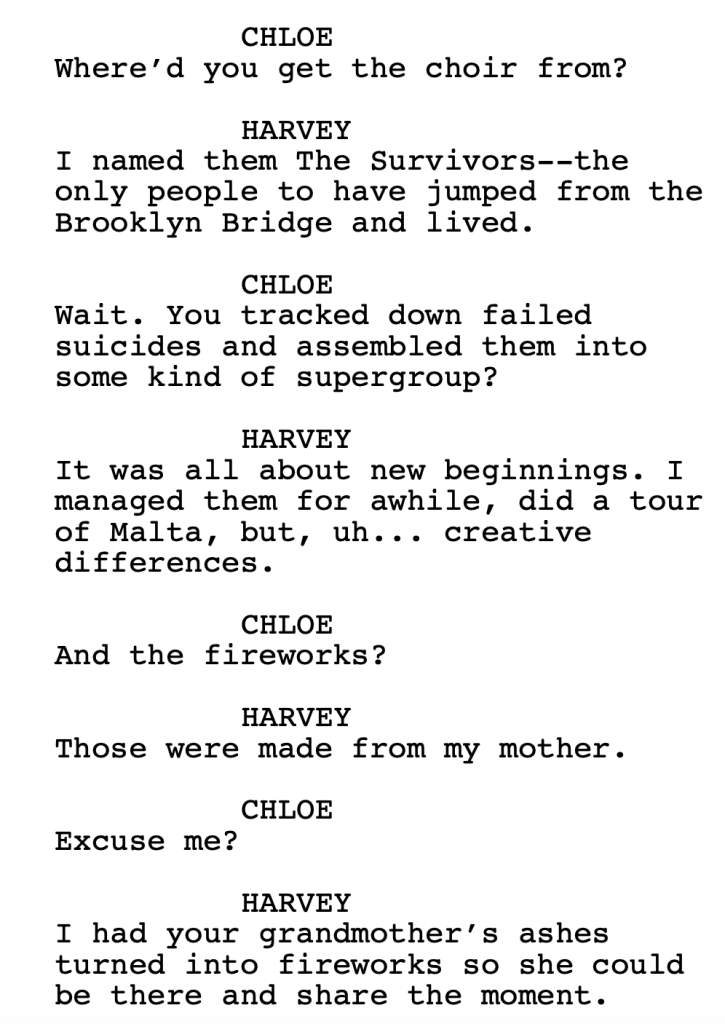Genre: Dramedy/Musical
Premise: A terminally ill, improvident father spends the last day of his life touring NYC with his estranged daughter, and has only a few hours to right a lifetime of wrongs…and make 1.2 million dollars.
About: This is the 6TH BEST SCRIPT from my contest, which had over 2000 entries. The Misery Index also finished Top 50 in last year’s Nichol contest.
Writer: David Burton
Details: 97 pages
If my contest were awarding scripts for how interesting they were, Osculum Inflame would be number one on the list. The Misery Index would be number two. It’s sort of like Big Fish meets Little Miss Sunshine. It’s one of those scripts that you’re not sure what to do with. And I mean that in a good way. You feel the power of something special being presented. Yet you’re not sure what to do with that power. Maybe you guys can help.
40-something New Yorker, Harvey Winters, has been informed by his doctor that he’s got inoperable cancer and he’s going to die. So on the one day of the week he gets to see his daughter, 11 year-old Chloe, he decides to apply for a 20 thousand dollar loan in the hopes that he and Chloe can turn it into 1.2 million dollars. Why 1.2 million dollars? We’re not told yet.
Harvey is a talker. He’s got a lot of things to say. Whereas your average dad will check his phone and point when you ask him where you’re headed, this is a typical Harvey response: “This way. Definitely this way. Two blocks until we get to the cafe where Crazy Joey Gallo was gunned down by Albert Anastacio in front of his children. Then we turn right and carry on until we see the apartment building where Kitty Genovese was repeatedly stabbed while 38 onlookers did nothing. From there, it’s a breeze.”
Harvey appears to have two goals here – have fun with his daughter and look for opportunities to make money. The first stop is a boxing match in Little Italy. Harvey plans to bet on himself to win. But when his opponent turns out to be a really good female kangaroo, he gets knocked out in the first round. This sends Harvey back to the hospital, where they inform him that the head-hit has given him a unique condition where he imagines everyone breaking into song. Which means the rest of our script is part-musical.
The next stop is an old genius stock broker friend of Harvey’s, a guy who was so smart, he invented “The Misery Index,” which can basically predict catastrophe with 75% accuracy. But it turns out his buddy’s gone a little cuckoo, a fact that is confirmed when he randomly hops out of their moving cab to avoid the government.
Harvey and Chloe attempt to get back some of those losses by participating in the 110th Annual Saddest Song In New York Contest. Harvey recruits a lookalike for the once famous artist, Christopher Cross, to help him win. But Fake Cross is on a different career path these days, and instead of singing one of his classic saddies, he sings a new song about killing his new girlfriend for cheating on him. They don’t win.
To add insult to injury, Fake Christopher Cross steals Harvey’s suitcase of money when he’s not looking, and disappears. This leaves Harvey, who’s terminally ill, penniless and prone to breaking into song, with nothing. Well, except for Chloe. And he figures that’s how it should be. Who cares about money and things and forced song singing when you have the most beautiful perfect daughter in the world with you for a day? Yeah, Harvey’s just fine with how this day ended up.
Take a look at these first ten pages if you get a chance. They’re REALLY good. Harvey, through voice over, tells us this complex backstory about how he ended up with cancer. It’s so unique and specific and fun that if this were a First 10 Pages Contest, this script would’ve won.
David is also really good with dialogue. Here’s Harvey describing to Chloe the day he proposed to her mother:
That fun back and forth banter between the two lasts the entire script and it’s one of many things that helped the script stand out. Another thing David did well was take us through a city we’ve seen tens of thousands of times before and made it feel different. This is important so pay attention. Especially if you’re a new writer. Most writers give us the version of something we already expect.
So if the movie is set in New York, the newbie writer is going to give us Time’s Square. We’re going to get the Empire State Building. We’ll of course have a major scene in Central Park. This script is not that. We do go to some well-known places, such as Little Italy, but the next thing you know we’re in an underground boxing match. I never knew where they were going next. It felt like an adventure in a far off land. Not New York City.
Another thing I liked was the choice to make the movie one day. Whenever you’re experimenting – writing something unique – consider condensing the time frame. It artificially gives a story structure it normally wouldn’t have. Without the one-day thing, you’ve got a dying man wandering around New York for weeks or months on end. It’s much harder to structure a story around that. This kept things tight.
However, even with that constraint, we still run into one of Misery Index’s biggest problems. It’s not clear what we’re doing here. We’ve got a suitcase full of money which we’re trying to turn into a lot more money but we’re not sure why. The reason this is problematic is that audiences struggle to root for characters when the consequences of their journey are unclear. Let’s say Harvey fails to turn the money into 1.2 million, what’s changed? Nothing. He didn’t succeed. But we didn’t know what he was trying to do anyway. So we don’t even know what he’s failed at.
I suppose the argument would be that the desire to make 1.2 million is a mystery and audiences will want to see that mystery solved. And we do eventually find out what the money is for. But I know, for me, I was more frustrated than curious about the plan. I wanted to know what the reason was we were doing all this.
I think if this script is going to reach its full potential, it needs a clearer destination. Sure, Little Miss Sunshine’s beauty pageant had zero stakes attached to it. But it still gave the movie a laser-like focus. Wherever we were in that movie, we always knew that they needed to get to that beauty pageant.
The question is, does David’s insane level of talent overshadow this weak story goal? And I think the answer to that question will change depending on who’s reading this. Because my mind kept changing throughout the script. One scene I’m like, “Yes!” Next scene I’m like, “No!” Next say I’m back to “Yes!” again. I mean what other writer on the planet casually drops a Mexican Independent Baseball Association backstory subplot into a screenplay? As far as I know, David is the only one.
I’m curious if that talent is enough to win you guys over. The good news is, we can all find out together. Download the script here!
[ ] What the hell did I just read?
[ ] wasn’t for me
[x] worth the read
[ ] impressive
[ ] genius
What I learned: HARVEY: “No. Christopher Cross has bushy hair and a big beard. He looks cool.” CHRIS: “Ah. Well, see, that’s Christopher Cross from 1980. I’m a Christopher Cross 2019 lookalike.” —- Don’t date your script by adding dates! Present dates and years are bad for your script. Why? Because let’s say you’re reading a script that references the year 2017. What are you going to think? Obviously, that the script was written in 2017. Which means the script is now FOUR YEARS OLD. Seasoned readers will immediately wonder why hasn’t it been able to attract any serious attention in those four years? It’s evil but this is how the reader’s mind works. So stay away from years if possible. But if you must use a year, stay on top of it. Always change it when the new year comes!



